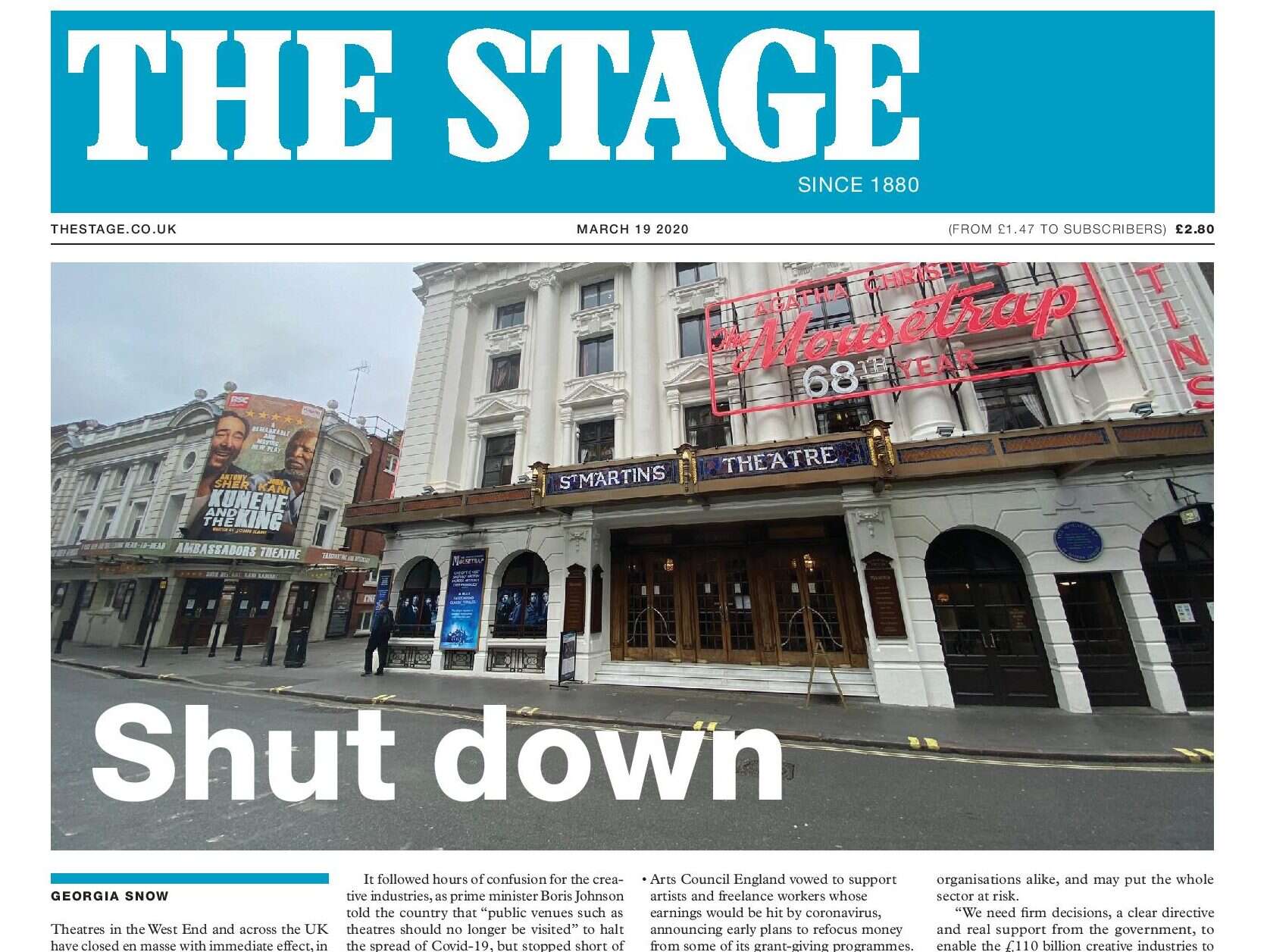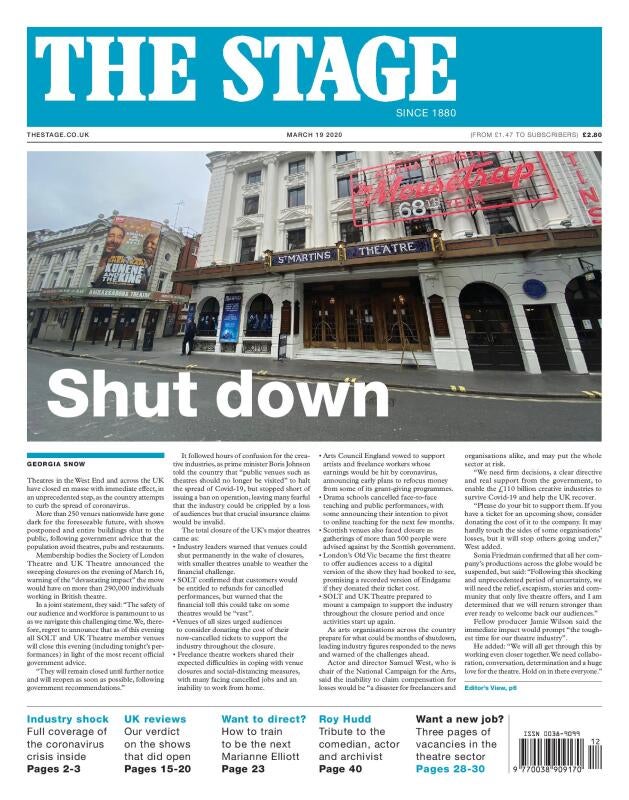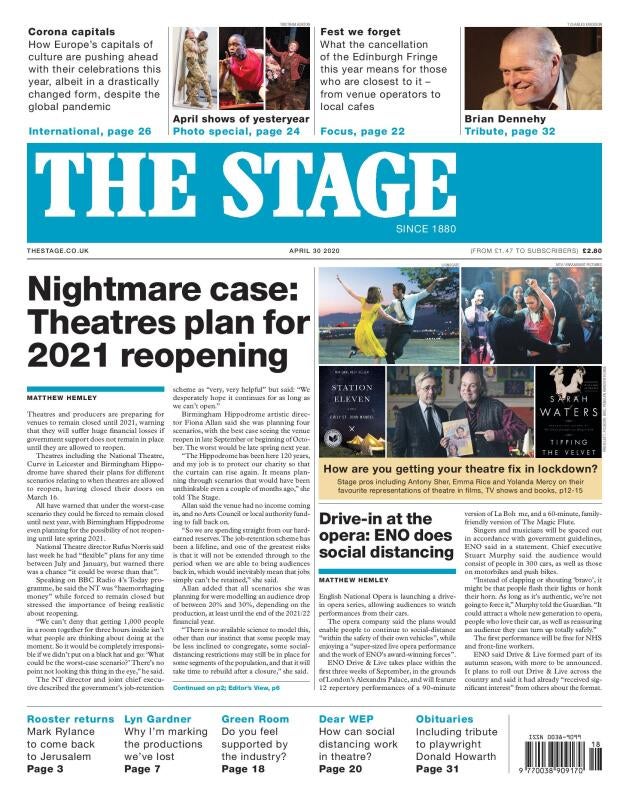
The editor of The Stage has said the title has proven more important than ever as theatres were forced to close during the coronavirus lockdown, although its long-term success is linked to the industry bouncing back.
UK theatres shut down en masse on 16 March shortly after Prime Minister Boris Johnson urged people to avoid them as well as pubs and clubs as part of social distancing measures to tackle the spread of Covid-19.
Overnight, The Stage lost the reviews content which makes up about a third of its coverage, including six pages in its weekly print edition, while its bread and butter profile interviews have also vanished for now.
Instead, its news team has become “extraordinarily busy” covering the impact on the trade, while features coverage has pivoted towards analysis and interviews with industry figures on coping with the lockdown.
All while The Stage’s 11 editorial and production staff adapted to working from home and launched a new website platform, which was already nine months in the making and went ahead despite the pandemic.
Editor Alistair Smith (pictured below) told Press Gazette he saw the newspaper’s coverage of the crisis in three phases: first how the industry and its workers survive shutdown financially, then what people are doing during the lockdown to continue creating or sharing previous work online, and finally how and when theatres will reopen and what that will look like.

The Stage editor Alistair Smith
Smith said the 140-year-old family-owned title’s role is now “probably even more important than it ever has been” because it can act as a “community glue” for everyone in the industry not in work, or working remotely.
“I think there’s a real role for us in making sure that that industry feels connected to each other and that community feels connected to each other… and aware of what’s going on and as informed as possible.”
Smith said this appeared to be bearing out in The Stage’s audience figures for March and April, as online traffic has grown 20 per cent year-on-year and digital subscriptions have seen a “significant increase”.
Even though print sales have taken a “significant hit” as people stay away from shops – the paper has a newsstand presence – Smith said there had nonetheless been a “reasonably significant” number of people signing up for print subscriptions online.
Digital subscriptions cost £8.50 per month while print subscriptions are £13 per month. The weekly paper costs £2.80 to buy, while readers who register with their email address can read three online articles a month for free.
Suspending print to focus on digital, as some other titles have been forced to do, was raised internally but was “never a likely scenario,” Smith said.
“I think the most likely chance of that happening would have been if the printers couldn’t print for whatever reason, and that never happened.”
Smith said the paper is in a “healthy position” in the short term as it was having a good financial year before the pandemic hit “with increasing subscriptions and a very settled team”, although he added that financially “that’s obviously not going to be the case anymore”.
“But it meant that we went into it in, from a publishing point of view, a relatively secure state,” Smith said.
“We are an old publication, we’ve been around for a long time and owned by the same family, they’ve always been very sensible about keeping cash in the business.
“And so, in a short to medium-term point of view, I would have thought we’re in a better position than a lot of other publishers.”
But longer term, the health of the UK theatre industry when it finally gets back up and running will impact on The Stage’s own standing.
“A large part of our business model is based on advertising, specifically recruitment advertising, so we will need an industry that is able to afford to advertise,” Smith said.
A greater proportion of staff in the commercial department have been furloughed as a result, compared to a very small number in editorial.
The Stage’s income is currently split between 55 per cent from advertising and 45 per cent from reader revenues, its two awards events and other revenue streams.
Smith said the proportion of revenue reliant on advertising has already decreased from 65 per cent in 2010, and that he plans to continue this shift in focus towards reader revenue.
For now, the big question remains when theatres will be allowed to reopen and the ongoing impact that social distancing could have on the industry.
“This could be a longer process for us than for a lot of other trade publications because it could be that the government support ends quite a long time before theatres are able to reopen again,” Smith said.
“And that will obviously have a knock on effect on us. So we’re waiting to find out like a lot of people what that will mean, and I think to some degree how secure we are will be linked to how secure the industry is.”
Read all Press Gazette’s coverage of the coronavirus pandemic and the news industry here
Email pged@pressgazette.co.uk to point out mistakes, provide story tips or send in a letter for publication on our "Letters Page" blog


